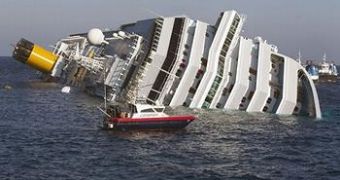The damaged 1,000-foot Italian cruise ship, which hit a rock off the coast of Tuscany and overturned, putting more than 4,200 passengers at risk, is considered a great threat for the environment at this point in time, since 198 drums of hazardous substances have ended up in the sea.
Italian Environment Minister has announced a state of emergency, worried that toxic chemicals discarded into the water could affect the ecosystem in an irreparable manner.
Since the alarming situation calls for immediate measures, the Italian Environment Minister Corrado Clini stated that restoring the balance of the affected area would become a top priority.
"The environmental risk for the island of Giglio is very high. The goal is to prevent the fuel from the ship coming out: we're working on that. The action is urgent, we hurry," explained the Environment Minister.
Giglio, located in the vicinity of the Tuscan coast is a hot spot for tourism and local people also depend on fishing activities; therefore preserving water quality is essential for their wellbeing.
The Italian authorities have scaled up efforts to solve this crisis situation. At this point in time, salvage company Smit is in charge of the clean-up operation, seeking to collect and remove the amount of fuel from the ship as soon as possible.
Apparently, there is no time-efficient method of cleaning up the mess, since the entire operation of taking 2,400 tons of fuel off the wrecked vessel could require up to two weeks, according to Smit representatives.
Even if measures of minimizing the environmental threat are being taken into consideration and applied in Italy, the most important concern is that all the toxic chemicals from Costa Concordia could leak into the sea, before the clean-up processes start, compromising water quality in the region and impacting the entire ecosystem.
At this point in time, the priority is to prevent the number of casualties from growing. Search and recovery operations play a vital part in this case, seeking to safeguard the victims. 15 people are still missing, 6 have died and 4,200 passengers are safe, 16 kilometers away from the place of the crash.

 14 DAY TRIAL //
14 DAY TRIAL //